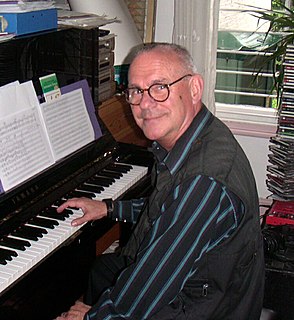
Richard Gavin Bryars is an English composer and double bassist. He has worked in jazz, free improvisation, minimalism, historicism, avant-garde, and experimental music.
Cornelius Cardew was an English experimental music composer, and founder of the Scratch Orchestra, an experimental performing ensemble. He later rejected experimental music, explaining why he had "discontinued composing in an avantgarde idiom" in his own programme notes to his Piano Album 1973.
Contemporary classical music is classical music composed close to the present day. At the beginning of the 21st century, it commonly referred to the post-1945 modern forms of post-tonal music after the death of Anton Webern, and included serial music, electronic music, experimental music, and minimalist music. Newer forms of music include spectral music, and post-minimalism.
Minimal music is a form of art music or other compositional practice that employs limited or minimal musical materials. Prominent features of minimalist music include repetitive patterns or pulses, steady drones, consonant harmony, and reiteration of musical phrases or smaller units. It may include features such as phase shifting, resulting in what is termed phase music, or process techniques that follow strict rules, usually described as process music. The approach is marked by a non-narrative, non-teleological, and non-representational approach, and calls attention to the activity of listening by focusing on the internal processes of the music.

Harold Montgomory Budd was an American avant-garde composer and poet. Born in Los Angeles and raised in the Mojave Desert, Budd became a respected composer in the minimalist and avant-garde scene of Southern California in the late 1960s, and later became better known for his work with figures such as Brian Eno and Robin Guthrie. Budd developed what he called a "soft pedal" technique for playing piano.
Audrey Riley is an English cellist and string arranger, based in the UK.
Howard While Skempton is an English composer, pianist, and accordionist.

Balanescu Quartet is an avant-garde string ensemble formed in 1987. Current members are Alexander Bălănescu (violin), James Shenton (violin), Helen Kamminga (viola) and Nick Holland (cello).
The Scratch Orchestra was an experimental musical ensemble founded in the spring of 1969 by Cornelius Cardew, Michael Parsons and Howard Skempton.
Jesus' Blood Never Failed Me Yet is a 1971 composition by Gavin Bryars based on a loop of an unknown homeless man singing a brief improvised stanza. The loop was the singer's recollection of the chorus of a Gospel hymn, by James M Black, published in 1911. Rich harmonies, comprising string and brass, are gradually overlaid over the stanza. The piece was first recorded for use in a documentary which chronicles street life in and around Elephant and Castle and Waterloo, in London. When later listening to the recordings, Bryars noticed the clip was in tune with his piano and that it conveniently looped into 13 bars. For the first LP recording, he was limited to a duration of 25 minutes; later he completed a 60-minute version of the piece for cassette tape; and with the advent of the CD, a 74-minute version. It was shortlisted for the 1993 Mercury Prize.

John White is an English experimental composer and musical performer. He invented the early British form of minimalism known as systems music, with his early Machines.
Promenade Theatre Orchestra (PTO) was an English quartet founded by John White in 1969 and consisted of the composer/performers White, Christopher Hobbs, Alec Hill, and Hugh Shrapnel. Although not one of the Scratch Orchestra's so-called 'sub-groups', the PTO often shared concerts and tours with the Scratch Orchestra as a distinct ensemble.
Dave Smith is an English composer, arranger and musical performer. Since 1971 he has been associated with the English school of experimental music.

Christopher Hobbs is an English experimental composer, best known as a pioneer of British systems music.
Experimental music is a general label for any music that pushes existing boundaries and genre definitions. Experimental compositional practice is defined broadly by exploratory sensibilities radically opposed to, and questioning of, institutionalized compositional, performing, and aesthetic conventions in music. Elements of experimental music include indeterminate music, in which the composer introduces the elements of chance or unpredictability with regard to either the composition or its performance. Artists may also approach a hybrid of disparate styles or incorporate unorthodox and unique elements.
The Sinking of the Titanic is a work by British minimalist composer Gavin Bryars. Inspired by the story that the band on the RMS Titanic continued to perform as the ship sank in April 1912, it recreates how the music performed by the band would reverberate through the water some time after they ceased performing. Composed between 1969 and 1972, the work is now considered one of the classics of British experimental music.
Ensemble Pieces is a 1975 classical music work by Christopher Hobbs, John Adams and Gavin Bryars.
Machine Music is a 1978 album by John White and Gavin Bryars. The album was the eighth release on Brian Eno's Obscure Records.
Irma is a 1969 experimental opera by artist Tom Phillips, Fred Orton and Gavin Bryars.




